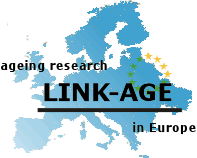|
Partner in charge: Tom Kirkwood
Each
Topic Sub-Group aims the development of common research goals
and strategies.
With
the growth in emphasis on shared access to data resources, particularly
in view of the advances in GRID computing that will facilitate
the interrogation and use of such distributed data, LINK-AGE will
establish a Data Co-ordination Working Group to interact with
the developers of GRID-enabled systems biology and bioinformatics
software, to determine common standards for data collection. In
some areas, e.g. DNA expression micro-arrays, standards are already
under development and the emerging standards will be adopted.
However,
in biogerontology there are particular issues concerning data
that may be collected longitudinally or in different age-cohorts
across the life span. In order that data can be compared most
effectively, the LINK-AGE Data Co-ordination Working Group will
seek to identify common standards not only for data formatting
but also for experimental design. In particular, the Working Group
will work to develop minimum standards for, e.g., number of age
groups to be included. At present, many ageing studies record
data for only two age groups (young and old). Not only is there
considerable inconsistency in what defines ‘young’
and ‘old’, but also information provided by such studies
fails to distinguish between early-life, maturational effects
and late-life, senescent changes.
Analysis of phenotypes is an important area where standardization
can make an enormous difference in the potential comparability,
and thus added-value, of research in both human populations and
other organisms. The Data Co-ordination Working Group will work
to establish agreed phenotypic measures than can be used to characterise
individuals in order to maximise the opportunities to make comparisons
between studies now and in the future. For example, in the context
of human ageing the ECHA and GEHA studies share a common interest
in defining a set of measures that can classify an older person’s
health status, so that factors (genetic or non-genetic) influencing
the health of older people can be assessed. Such instruments need
to be applied widely if the full value of research in such populations
is to be derived.
The development of standardized data collection will lead to opportunities
to improve data processing including statistical analysis. A secondary
objective for the Data Co-ordination Working Group will be to
identify and promote best practice in data processing. This will
involve input from bioinformaticians and biostatisticians and
links will be developed with initiatives to build national and
trans-European research capacity in integrated systems biology,
which combines theoretical and experimental inputs using technologies
such as high throughput proteomics and expression array or similar
methods. The LINK-AGE/LIFESPAN Workshop on "Data Handling for Biogerontology Research"
took place on 29-30 April 2010
in Newcastle upon Tyne, UK
|



